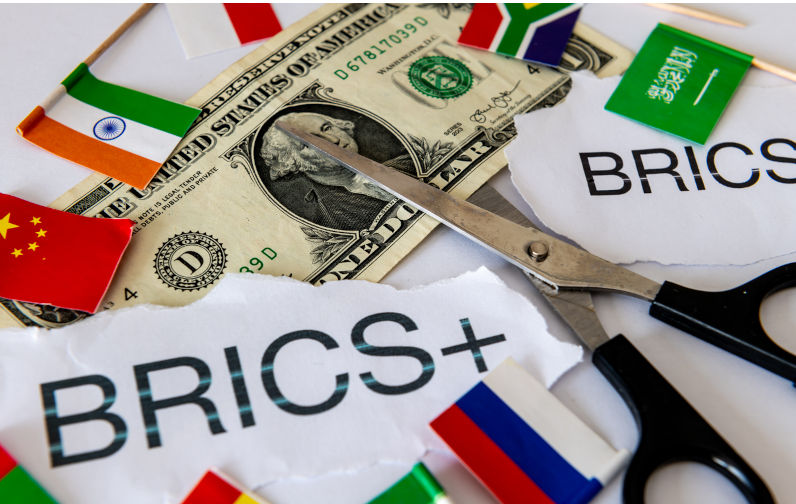Building a new global economic order: The role of BRICS
September 30, 2024
Over the past few decades, the Western economic system has shifted increasingly towards financialisation, prioritising the creation of paper wealth through financial markets rather than real economic output. This trend has led to significant imbalances, with wealth accumulating disproportionately in financial assets, rather than contributing to tangible improvements in living standards or infrastructure.
Meanwhile, the BRICS nations — Brazil, Russia, India, China, and South Africa — have taken a different path. By focusing on manufacturing, technology, infrastructure, agriculture, and export industries, they have seen sustained economic growth, increased GDP, and tangible improvements in the quality of life for their populations.
In contrast, Western economies, particularly the United States and the United Kingdom, face numerous challenges. Manufacturing industries have moved offshore, often to countries offering more favourable economic conditions. Educational and health outcomes have stagnated or declined, and public dissatisfaction with governance has reached record levels. In both the US and the UK, life expectancy has plateaued or even decreased. Moreover, the infrastructure in these countries, particularly in the US, is aging rapidly, with little investment to modernise systems that are essential for supporting progressive manufacturing and industrial sectors. As a result, GDP growth in these economies is either flatlining or contracting, further undermining their global influence.
Despite these internal challenges, Western nations have maintained an outsized influence on international organisations such as the United Nations, the World Bank, the International Monetary Fund and the World Trade Organisation. This post-World War II geopolitical order has enabled the West to shape global economic policies in its favour, often at the expense of the Global South. However, this status quo is increasingly being challenged. Countries in the Global South are advocating for a new global architecture that better represents their interests and reflects the changing balance of economic power.
In response to these dynamics, BRICS was formed more than 15 years ago to establish a new framework for global economic cooperation. Unlike NATO, which was designed as a military alliance for the defence of Western Europe, BRICS is an economic partnership aimed at improving the living standards of its member nations and promoting development across the Global South. The bloc is committed to creating a more equitable international system, one that moves away from the dominance of Western-led institutions like the IMF and World Bank.
Key to BRICS’ strategy are initiatives such as the New Development Bank and the Shanghai Cooperation Organisation. These institutions provide low- or no-interest loans and grants, funding major infrastructure projects across the developing world. By investing in infrastructure and development, BRICS nations are helping to break the cycle of dependency that has often been reinforced by Western-dominated financial institutions. This focus on real economic development stands in contrast to the West’s approach, which has often tied financial assistance to stringent neoliberal reforms that have been detrimental to the recipient nations’ long-term development.
The growing influence of BRICS is also evident in its economic performance. In 2000, BRICS nations accounted for 21.37% of global GDP, measured in terms of purchasing power parity, compared to the G7’s 43.28%. By 2023, BRICS had significantly closed this gap, contributing 34.92% of global GDP, while the G7’s share had dropped to 30.05%. Additionally, BRICS countries now control more than 40% of global oil production. As new members, such as Venezuela, join, this share is expected to exceed 50%, further enhancing the bloc’s economic influence.
The expansion of BRICS is also gaining momentum. More than 60 countries have expressed interest in joining, with 16 having already formally applied and five admitted as new members. As of today, BRICS+ represents 3.5 billion people — nearly 50% of the global population — compared to the G7, which represents approximately 10%. With the addition of new members, BRICS is projected to account for well over 50% of the global population in the near future. This demographic and economic shift underscores the bloc’s growing role in shaping the future global order.
One of the most significant developments in BRICS’ strategy is its ongoing efforts to reduce dependence on the US dollar in international trade. The bloc is working on a gold-backed, blockchain-based payment system to create an alternative to the US-dominated financial system. The use of the dollar in international settlements has already declined sharply, from more than 70% five years ago to less than 60% today. Experts predict that the US dollar’s dominance could be entirely eroded by 2030, especially as BRICS expands and other countries adopt alternative currencies for international trade.
The war in Ukraine has further accelerated the shift towards BRICS, as many countries in the Global South grow wary of the US dollar’s role as a geopolitical weapon. The imposition of sanctions and the freezing of international reserves have demonstrated the vulnerability of countries that do not align with Western interests. Many nations are now seeking alternatives to mitigate the risk of their own reserves being targeted by US sanctions, which have often been imposed in violation of international law.
BRICS has positioned itself as a leader in advocating for a fairer, multipolar world order. Its stated mission is to lift humanity out of poverty and promote a global system based on equity, respect for international law, and inclusive development. As the world faces increasing geopolitical instability, rising nationalism, and the potential for large-scale conflict, BRICS offers an alternative vision for a more balanced and peaceful future.
BRICS is rapidly emerging as a central force in shaping a new global order. Its emphasis on real economic development, infrastructure investment, and equitable international cooperation offers a stark contrast to the declining influence of Western-led institutions. As the bloc continues to expand its membership and influence, it has the potential to redefine the rules of the global economy and provide a more inclusive and just framework for international relations.
